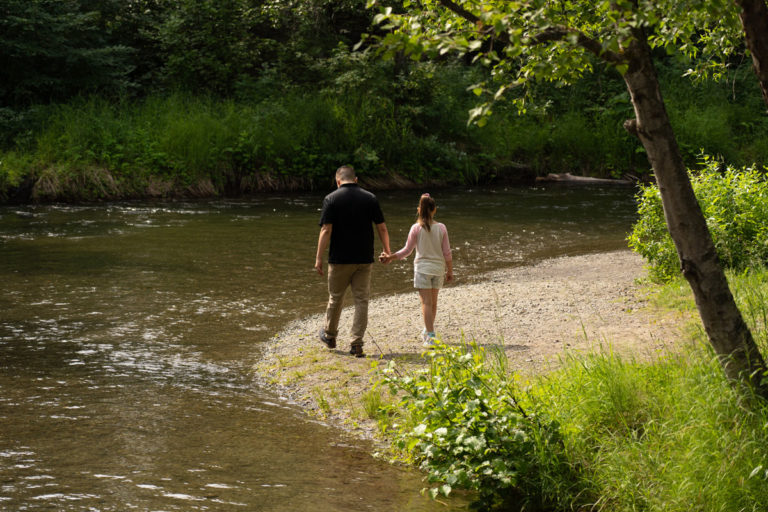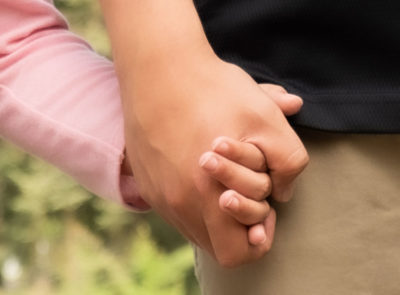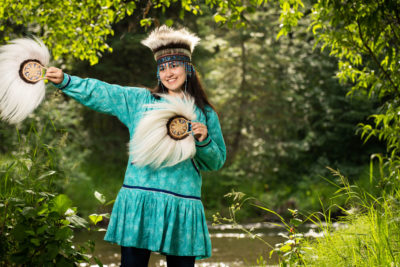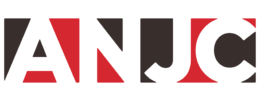ANJC launches a new mentoring program for Alaska Native youth, in partnership with Big Brothers Big Sisters Alaska

Justin Hatton still remembers the former youth program manager who helped him get his high school diploma. In fact, he still talks to her to this day. “Shirley Tuzroyluke is like a surrogate mother to me,” said Justin, who is now the Youth Program Manager at the Alaska Native Justice Center (ANJC). “I had a troubled past when I was teenager. But having an Alaska Native mentor like her certainly impacted my life as an Alaska Native adolescent youth. A good mentor can make all the difference.”
ANJC is helping ensure that more young Native kids can find strong Alaska Native mentors through a new partnership with Big Brothers Big Sisters Alaska (BBBS). Anikatiga (Iñupiaq for “my brother or sister”) is a new ANJC youth development program that aims to improve academic outcomes and increase resiliency among Alaska Native students by connecting BBBS “littles” and their families to case management, social service referrals, cultural connection, mentoring, and more.
Doing What We Do Best
By partnering together, both ANJC and BBBS can do what they each do best. BBBS creates one-to-one mentoring relationships that empower young people to achieve their full potential. Meanwhile, ANJC leverages its partnerships with CITC’s Youth and Employment departments and other organizations to help families meet household needs, access recovery services, support education goals, and more.
A major goal of Anikatiga is to decrease risk factors that contribute to the disproportionately high numbers of Alaska Native youth represented in Alaska’s juvenile justice system. Creating a strong network of family and mentors surrounding a young person is a good start, said Jordie.
“Part of ANJC’s focus is creating plans and referrals that help families become healthier, too,” explained Justin. “If the household is able to meet its needs, a family gains a healthier outlook, and the youth, in turn, will gain resiliency.”
Success at School
 “We’re optimistic we can make a change for our littles, especially in the school setting,” added Justin.
“We’re optimistic we can make a change for our littles, especially in the school setting,” added Justin.
Alaska Native students persistently graduate high school at a lower rate than students of other ethnicities, a statistic that is influenced early on by academic underperformance and poor school engagement. Research has shown that barriers to educational attainment influence the likelihood that a student may be involved in the juvenile justice system.
“If we can get to them now, when they’re still students, we can help prevent a lot of hardships,” said Justin.
Through Anikatiga, ANJC will provide academic tutoring and support to teachers to ensure Alaska Native students get the education they deserve and help them stay connected to school, said Justin. The program hopes to improve academic outcomes among Alaska Native students in Alaska’s four largest school districts, with an emphasis on increasing a feeling of connectedness to school and decreasing absences.
Culturally Connected

In addition to supporting success in school, Anikatiga emphasizes connection to Alaska Native culture. ANJC staff are planning the program’s first annual event, a camp or retreat that will take place this fall and will incorporate Alaska Native cultural activities.
More important that gatherings, workshops, and organized meet-ups, though, is the presence of an Alaska Native mentor in the life of a little.
Anikatiga serves Alaska Native youth ages 6 – 19 in Anchorage, the Mat-Su Valley, Juneau, and Fairbanks. Currently, the program is working with six youth. But with plans to pair 113 Alaska Native youth with mentoring and a goal to offer at least 30 opportunities for cultural connection, ANJC sees an urgent need for more Alaska Native adults willing to become “bigs.”
“Right now, there just aren’t that many Alaska Native ‘bigs,’ so that’s where we step in as case managers, providing another mentor role and helping young people feel connected to their culture,” Justin said. “From my own experience, having an Alaska Native mentor made all the difference. We face so many challenges as young Native people, that support from someone who believes in you and understands you can be really powerful.”
ANJC is helping to streamline training for Alaska Native people who wish to become mentors through BBBS. The organization will also provide cultural resources for all bigs and has plans to host three or four youth at a time for in-person, “socially distanced” cultural workshops, which are currently being held virtually.
To find out more about becoming a big and mentoring a young person, you can start by filling out an online enrollment form at Big Brothers Big Sisters Alaska. Learn more about ANJC by following the organization on Facebook.
